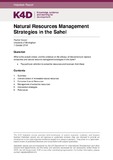| dc.contributor.author | Cooper, Rachel | |
| dc.coverage.spatial | Sahel | en |
| dc.coverage.spatial | Burkina Faso | en |
| dc.coverage.spatial | Chad | en |
| dc.coverage.spatial | Mali | en |
| dc.coverage.spatial | Mauritania | en |
| dc.coverage.spatial | Niger | en |
| dc.date.accessioned | 2019-01-15T13:15:55Z | |
| dc.date.available | 2019-01-15T13:15:55Z | |
| dc.date.issued | 2018-10-01 | |
| dc.identifier.citation | Cooper, R. (2018). Natural Resources Management Strategies in the Sahel. K4D Helpdesk Report. Brighton, UK: Institute of Development Studies | en |
| dc.identifier.uri | https://opendocs.ids.ac.uk/opendocs/handle/20.500.12413/14277 | |
| dc.description.abstract | This helpdesk review has drawn primarily on evidence from systematic reviews and synthesis studies focused on natural resources management strategies in Sahel (Burkina Faso, Chad, Mali, Mauritania and Niger). It identifies effective strategies to improve renewable natural resources management have focused on land rehabilitation and water management. Projects such as the World Food Programme Cash for Assets in Niger have increased the number of hectares under cultivation in targeted areas. Successful strategies involve local communities and need to be scaled-up to the national or regional level. However, key challenges to be taken into consideration in managing renewable natural resources are: increasing conflict between pastoralists and farmers, poor soils and soil erosions, land-use and land-cover changes, the inter-connected nature of environmental issues and climate change. In addition to this, extractive resources, including uranium in Niger and oil in Chad, are extremely important export commodities for the countries of the Sahel. However, NGOs, civil society and donors are concerned about the transparency and governance of extractive industries as well as the generation and use of revenues (Larsen & Mamosso, 2014). Practitioners, donors and academics have suggested a number of strategies or interventions to improve the effectiveness of extractive resources management. These include improving the flow of information about extractives; greater disclosure of information and compliance with the Extractive Industries Transparency Initiative; and, building the capacity of government staff to monitor compliance with regulations (IMF, 2016; Larsen & Mamosso, 2014). The World Bank and IMF are key actors working to improve governance of the extractives sector. | en |
| dc.language.iso | en | en |
| dc.publisher | IDS | en |
| dc.relation.ispartofseries | K4D Helpdesk Report;453 | |
| dc.rights.uri | https://www.nationalarchives.gov.uk/doc/open-government-licence/version/3/ | en |
| dc.subject | Climate Change | en |
| dc.subject | Economic Development | en |
| dc.subject | Environment | en |
| dc.subject | Rural Development | en |
| dc.title | Natural Resources Management Strategies in the Sahel | en |
| dc.type | Helpdesk | en |
| dc.rights.holder | © DFID - Crown copyright 2018. | en |
| dcterms.dateAccepted | 2018-10-01 | |
| rioxxterms.funder | Department for International Development, UK Government | en |
| rioxxterms.identifier.project | K4D | en |
| rioxxterms.version | VoR | en |
| rioxxterms.funder.project | 238a9fa4-fe4a-4380-996b-995f33607ba0 | en |

